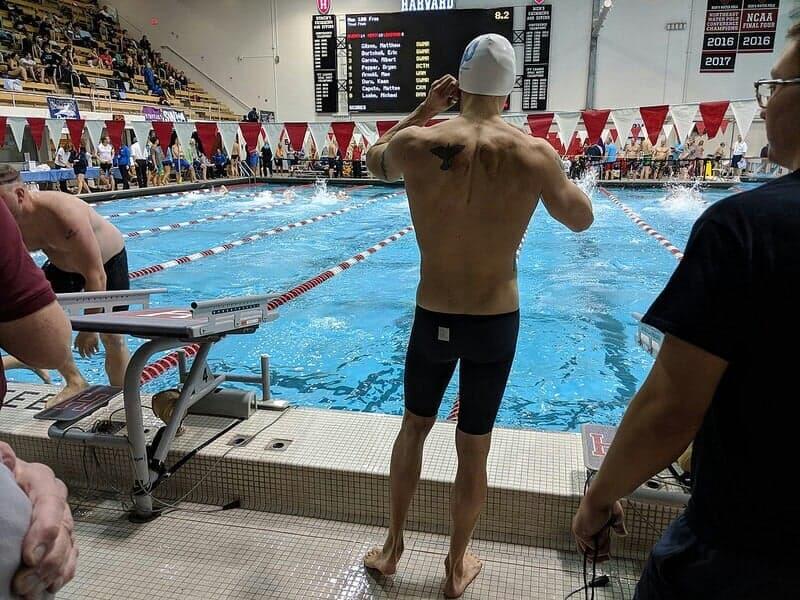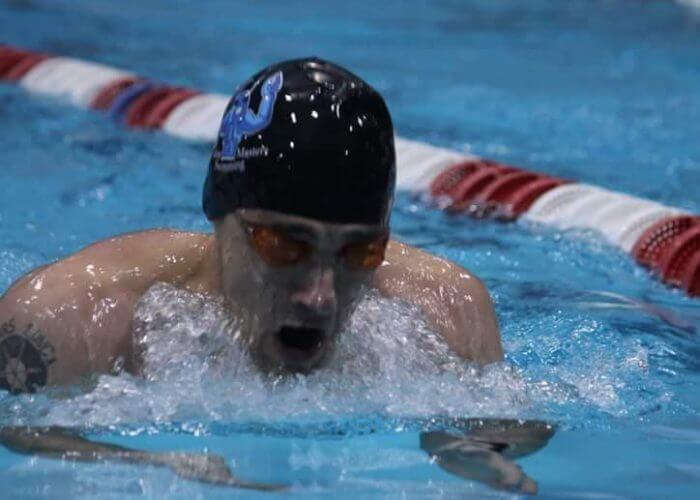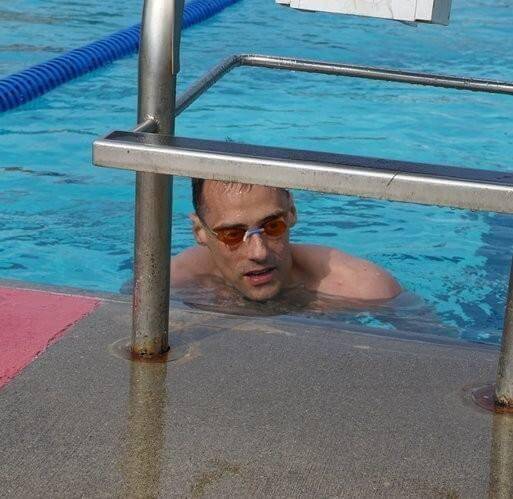The Struggle is Real: Burnout in Competitive Swimming

By Lianne McCluskey (From the Archive)
Burnout is a common occurrence in sport, but for many reasons, it is prominent in competitive swimming. It’s no secret that swimming is extremely difficult and is associated with early specialization. Unfortunately, talented swimmers will stop due to factors associated with burnout, leading them to give up on the sport they once loved. Some have known for a long time that the joy was no longer there when they dove into a pool for training or racing.
With the increase in demands to become better as we get older, it can be hard to remember why we began swimming in the first place. Do the costs outweigh the rewards?
Athlete burnout can be defined as physical and emotional exhaustion, reduced sense of accomplishment, and the devaluation of sport. A common risk factor for burnout is a perfectionist mindset or “over-achievers” who focus too hard, creating added physical and emotional anxiety. It’s easy to assume that by going above and beyond what is expected of you as an athlete, you will get faster: when we fall short, it can be devastating.

Photo Courtesy: Tim Lecrone
“Swimming is so goal oriented and is absolute and concrete, because it is all about numbers. You put so much of everything you have – physically and mentally – into it that when you fall short, it is heartbreaking,” says Tim Lecrone, who swam competitively for the University of Maine (’96 alum). During his time at UMaine, Lecrone had his heart set on qualifying for the Olympic Trials in the sprint freestyle events.
“At the end of my college career, there were some nights where I cried myself to sleep,” he confessed. This disappointment led to a 10-year hiatus. Lecrone was able to eventually come back to the sport, but this is not the case for many who completely burn out.
After college swimming, lingering thoughts of giving it another chance persisted, and he maintained the delusion of being able to qualify for Trials. However, when Lecrone decided to go to graduate school and then became a father, he saw the opportunity fading away. “The level of effort that it took for me to focus on those goals became impossible,” said Lecrone. “I just sort of gave up on it. When you give up on something you love, I think it’s common for things to be a little bit bitter, and that was definitely the case for me.”
There were a few steps that drew him into the process of returning to swimming, beginning with getting involved in coaching and maintaining a relationship with his own college coach. Following the passing of his grandmother and having just moved back to his hometown of Waterville, Maine, he was inspired to get back in the pool and prepare for an upcoming alumni meet at the University of Maine. Then, he joined US Masters Swimming. Although he was enjoying himself in the water again, deep down he was still focused on his former accomplishments and abilities.
It took three years to gain a certain level of perspective and establish a new routine around swimming, allowing him to let go of the swimmer he once was. “I was able to put away what I used to be and focus on what I currently was at the time,” said Lecrone.
Additional Risk Factors
Physical and emotional anxiety in swimming can also come from sources outside of an athlete’s control. Feelings of obligation to a team or parental pressure to perform can lead to a breaking point where the swimmer essentially hangs up the goggles and towel for good, letting go of the goals they once had because they are no longer swimming for themselves.
Along the same lines, swimmers who have been involved in swimming for a long period of time may feel stuck and unable to improve, leading to a decrease in motivation. This is known as the swimmer’s plateau – the state of swimming where we see little or no change in ability. One may be susceptible to losing confidence in their overall identity in this case and may completely lose the desire to swim.
Characteristics that can increase the risk of burnout are having one’s identity strongly linked to the sport and low psychological flexibility. Add other factors such as over-training, lack of recovery, psychosocial stress, or the feeling of entrapment, and you have the perfect recipe for burnout.

Photo Courtesy: Lisa Jane Lattes
For Anabel Carter, a former competitive swimmer who was successful at both the high school and NCAA Division III level, she wasn’t sure she wanted to swim in college in the first place. She improved steadily and enjoyed swimming throughout her career but did not label her identity as a “swimmer.”
“I never fully wanted to swim in college, but I talked to the coach before going to school and it got me excited,” said Carter. “I still liked swimming but didn’t want it to take over my life, that’s what I was worried about.” At every age before college, Carter explained that she tried other sports growing up, and swimming was her favorite; however, she knew the new demands and time commitment as a collegiate athlete may cause her to burn out.
“I definitely still enjoyed competing and met a lot of people [through college swimming], but it was just taking up so much time where I thought I could have been dedicating myself to school,” said Carter. “I was going to this great school, and I didn’t feel like I had enough time to do my school work exactly how I wanted to do it.”
Going into her senior year, despite her success and positive experience with her collegiate coaches and teammates, Carter made the decision to stop swimming to focus on her senior thesis.
“I really hated it after a while, which is really sad because I used to love swimming,” said Carter. “In high school and middle school, it was so fun.” When she really loved swimming, Carter says she felt satisfaction in seeing her hard work pay off, which became more challenging as she got older.
Another deciding factor for Carter (and many other athletes) was the desire to participate in different activities. This is one of the most prominent reasons for quitting any sport. To avoid losing interest in swimming altogether, some athletes choose not to compete in college athletics to preserve their desire to swim on their own terms.
Carter admits that although she does not swim consistently, she still enjoys the feeling she gets in the water and swims on her own time.
Reducing the risk of burn out
Lecrone says he had an epiphany that was related to another factor in why people stop swimming: performance anxiety. He described how by the time he was a senior in college, swimming had become more of a job than a passion. Years later, sitting behind the blocks at a Masters Swim Meet, he noticed a man a few heats ahead of him behind the blocks with a huge smile on his face. “I thought to myself, ‘What is this guy’s problem?’ I had all this stress going on, and then I realized I was the one who had the problem. He was just having fun and loving what he was doing.”
In order to come back from the original emotions that led to his burn out, Lecrone needed to find new ways to make the process fun again and be like a kid again. He wanted to go to practice excited to be in the water rather than experience meet anxiety that had developed throughout college and persisted.

Photo Courtesy: Tim Lecrone
“The more we get back toward what swimming meant to us when we were 8 & unders, the more fun it is going to be. You are living in the moment one hundred percent,” said Lecrone. “I am doing this because I love to do this, and competing is just an expression of that. It shouldn’t be something that makes me unhappy or stressed out.”
This realization was very transformative for him, which fueled his decision to learn how to train smarter, not harder. While attending Short Course Y Nationals in Ft. Lauderdale as a coach, he had a conversation with Olympian Josh Davis, who convinced him to change his training plan to focus more on ultra short race pace training (USRPT), which has become a more common practice among all levels of competitive swimming.
“I found that I really enjoyed it and was able to put more of myself into it,” said Lecrone. “I wound up going faster and faster just because I was having so much fun again.” What works for each person is more mental than physical, and Lecrone emphasized that it’s important to do what works best for you. For him, he had a mental and physical connection to USRPT training, which pulled him back into training.
Adopting an autonomous coaching style that meets a swimmer’s needs will create more enjoyment in the process and allow for early identification and awareness of the risk factors associated with burnout.
What mindset change will help protect you from burnout?
All commentaries and research was conducted by the the author and do not necessarily reflect the views of Swimming World Magazine nor its staff.




I swam for 15 yrs until my junior year in college. Left the sport and did not come back to swimming for 23 yrs. now I’m 50 and have been swimming for the past 4 yrs including Masters. I forgot how wonderful the water made me feel after working out.
Lianne McCluskey although I’m already fielding some teasing, i appreciate your talent and ability to capture the emotions ?
Tim Lecrone screw them! You’re badass
Lianne McCluskey emphasis on “bad” ?
Hey if you feel good about you every day you’re doing something right! Nothing else matters except you doing you, everything else falls into place where it’s supposed to be.
Lianne McCluskey it’s inherent in my introverted nature.
Beth Germeraad Rodriguez
Lindsay Swiderski-Taggart..this is her..☹️
Jen Thompson so ironic…right after I texted you, I saw this article ?
It’s because you can’t eat a elephant in one bite. You have to chop it up in small pieces and devour it over time.
My goodness, what an excellent read! As a small USA swim coach in St. Louis, we deal with this often. As coaches, we try to bring as much fun and variety into our workouts as we can. It keeps the swimmers guessing and wondering what we will come up with next. Are we the fastest team . . . nope, but hopefully we will give our swimmers a lifelong love for the sport.
Eve George Vogt Chris Vogt
Great article, so true
Jay V Elez